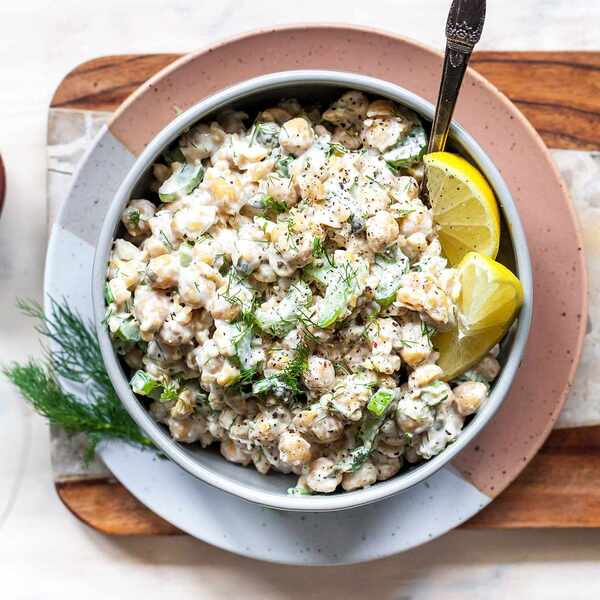This creamy yet light vegan salad is full of bright, herby goodness. On its own, it’s great to serve alongside a sandwich or veggie burger in place of potato salad or coleslaw. You can also make it into a light lunch by adding a handful of arugula to enjoy it as a green salad. Double the recipe and refrigerate to have on hand throughout the week.
Updated on April 19, 2024
Cook Mode
(Keep screen awake)
Ingredients
-
1 (15 ounce) can low-sodium chickpeas, rinsed
-
⅓ cup finely chopped celery
-
¼ cup vegan mayonnaise
-
¼ cup chopped fresh dill
-
1 scallion, finely chopped
-
2 teaspoons capers, chopped
-
2 teaspoons lemon juice or more to taste
-
¼ teaspoon ground pepper
Directions
-
Place chickpeas in a clean kitchen towel. Fold the towel over and gently rub the chickpeas to release any loose skins. Discard the skins; transfer the chickpeas to a medium bowl. Mash the chickpeas with a fork. Add celery, mayonnaise, dill, scallion, capers, lemon juice and pepper; stir until well coated.
Tips
To make ahead: Cover and refrigerate for up to 4 days.
Originally appeared: EatingWell.com, August 2020
Nutrition Facts (per serving)
| 186 | Calories |
| 12g | Fat |
| 16g | Carbs |
| 5g | Protein |
| Nutrition Facts | |
|---|---|
|
Servings Per Recipe 4 |
|
|
Serving Size 1/2 cup |
|
|
Calories 186 |
|
| % Daily Value * | |
|
Total Carbohydrate 16g |
6% |
|
Dietary Fiber 5g |
16% |
|
Total Sugars 3g |
|
|
Protein 5g |
10% |
|
Total Fat 12g |
15% |
|
Saturated Fat 1g |
6% |
|
Vitamin A 93IU |
2% |
|
Vitamin C 2mg |
2% |
|
Folate 34mcg |
8% |
|
Sodium 262mg |
11% |
|
Calcium 36mg |
3% |
|
Iron 1mg |
4% |
|
Magnesium 19mg |
4% |
|
Potassium 110mg |
2% |
Nutrition information is calculated by a registered dietitian using an ingredient database but should be considered an estimate.
* Daily Values (DVs) are the recommended amounts of nutrients to consume each day. Percent Daily Value (%DV) found on nutrition labels tells you how much a serving of a particular food or recipe contributes to each of those total recommended amounts. Per the Food and Drug Administration (FDA), the daily value is based on a standard 2,000 calorie diet. Depending on your calorie needs or if you have a health condition, you may need more or less of particular nutrients. (For example, it’s recommended that people following a heart-healthy diet eat less sodium on a daily basis compared to those following a standard diet.)
(-) Information is not currently available for this nutrient. If you are following a special diet for medical reasons, be sure to consult with your primary care provider or a registered dietitian to better understand your personal nutrition needs.


Leave a Reply